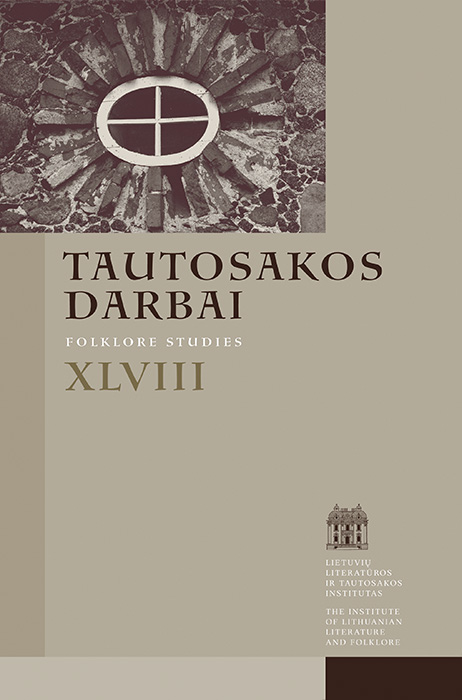Folklorinė sapno kalba: oneiriniai naratyvai bendruomeninėje komunikacijoje
Santrauka
Kultūros tyrimuose, kaip ir psichologijoje, pastebima tendencija apibrėžti sapną kaip tam tikrą kalbą, turinčią savitus sklaidos dėsnius, prasmes ir struktūrą. Itin aktuali tampa skirtis tarp absoliučiai individualios, pasak Jurijaus Lotmano, komunikacijai neparankios sapno kalbos ir sapno pasakojimo kalbos, kuri privačią oneirinę patirtį transformuoja į viešą bendruomeninį performansą, tiesiogiai susijusį su tradicijos visetu. Folklorinių sapnų pasakojimų, kurie laikytini vienintele tradicinio pasaulėvaizdžio studijoms prieinama oneirinės patirties išraiška, tyrimuose iškyla būtinybė šią folkloro dalį interpretuoti ne kaip atskirus tradicinius naratyvus, o kaip neatsiejamą bendruomeninės komunikacijos sandą, kaip reikšmingą susižinojimo ir bendruomenės narius vienijančių ryšių palaikymo priemonę. Pasitelkiant aktualias oneirinių naratyvų ir folkloro kaip komunikacijos tyrimų prieigas, taip pat pastarojo dešimtmečio folkloro ekspedicijose sukauptą medžiagą, straipsnyje ieškoma atsakymų į klausimą, kokią vietą tradicija paremtoje komunikacijoje užima ir kokį vaidmenį atlieka sapnų pasakojimai bei jų klausymasis, kokias bendruomenines laikysenas skatina ir palaiko tokie pašnekesiai tradicijos sankcionuota kalba.
Atsisiuntimai
Skaitomiausi šio autoriaus(ų) straipsniai
- Austė Nakienė, Radvilė Racėnaitė, Vita Ivanauskaitė-Šeibutienė, Rytis Ambrazevičius, Lina Būgienė, Gražina Kadžytė, Rima Visackienė, Irena Žilienė, Andželika Jakubynienė, Kronika , Tautosakos darbai: T 52 (2016)
- Vita Ivanauskaitė-Šeibutienė, Laiškai tartum Dievo pyragai. Vyskupo Teofiliaus Matulionio epistolinio palikimo knyga , Tautosakos darbai: T 68 (2024): Tautosakos darbai
- Vida Norvaišienė, Dainius Razauskas, Rūta Žarskienė, Vita Ivanauskaitė-Šeibutienė, Lina Būgienė, Kronika , Tautosakos darbai: T 49 (2015)
- Vita Ivanauskaitė-Šeibutienė, Skambanti užstalė: vaišių dainos tradiciniuose bendruomenės sambūriuose , Tautosakos darbai: T 50 (2015)
- Vita Ivanauskaitė-Šeibutienė, Didžiosios dainų knygos: lietuvių dainynų mokslinės edicijos pradmenys brolių Juškų folkloro publikacijose , Tautosakos darbai: T 57 (2019)
- Guntis Pakalnas, Rimantas Sliužinskas, Asta Skujytė-Razmienė, Radvilė Racėnaitė, Vita Ivanauskaitė-Šeibutienė, Rūta Žarskienė, Lina Leparskienė, Andželika Jakubynienė, Kronika , Tautosakos darbai: T 47 (2014)
- Audronė Gedžiūtė, Jūratė Šlekonytė, Jurgita Ūsaitytė, Vita Ivanauskaitė-Šeibutienė, Kronika , Tautosakos darbai: T 57 (2019)
- Vita Ivanauskaitė-Šeibutienė, Tradicijos refleksija dailininko raštuose, arba Besimokant antropologijos iš Stasio Eidrigevičiaus , Tautosakos darbai: T 55 (2018)
- Vita Ivanauskaitė-Šeibutienė, LITUANUS: The Lithuanian Quarterly Journal of Arts and Sciences, vol. 60:4, Winter 2014 , Tautosakos darbai: T 49 (2015)
- Lina Būgienė, Vita Ivanauskaitė-Šeibutienė, Akvilė Sadauskienė, Informacija , Tautosakos darbai: T 63 (2022)
